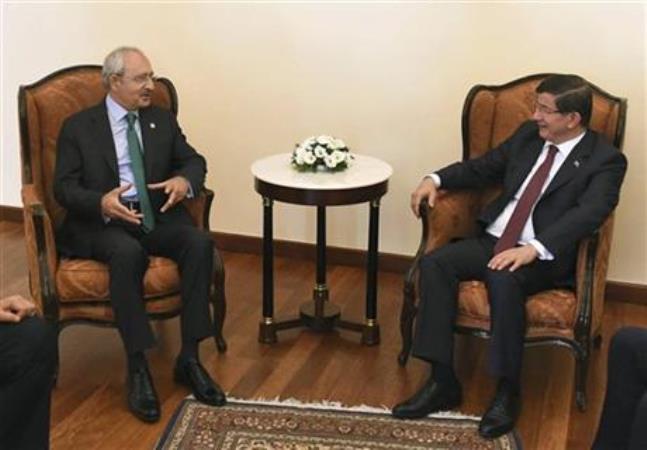
Efforts on Thursday by Turkish Prime Minister Ahmet Davutoglu to forge a coalition alliance with the country's pro-secular party failed, edging the country closer toward new elections.
Davutoglu said discussions with pro-secular party leader Kemal Kilicdaroglu were frank but the two party leaders could not reach common ground for a power-sharing deal.
"The likelihood of going to (elections) has increased. In fact, it has become the only option," Davutoglu said after the talks that lasted less than two hours
He did not say when the elections could be held but said a date should be set "at the closest time possible."
Davutoglu's Islamic-rooting ruling party lost its majority in elections in June, forcing it to seek a coalition alliance to remain in power. The deadline for forming a government is the end of next week, before new elections are called.
The prime minister could still turn to the nationalist party for a partnership, but that party's leader has ruled out joining any party in a coalition. Another option is for the ruling party to form a minority government but that would need the support of another party in a vote of confidence.
The development pushes Turkey into political uncertainty at a time when it is faced with a sharp surge of violence and the country is taking a more front-line role in a U.S.-led campaign against the Islamic State group.
President Recep Tayyip Erdogan was reported to favor renewed elections in the fall, in the hope that the ruling party, which he founded, can regain parliamentary majority. Officials say the party's grassroots is also opposed to a coalition with the pro-secular party.
In recent weeks, dozens have been killed in renewed clashes between Turkish security forces and Kurdish rebels, while Turkish jets have conducted air raids on IS targets in Syria and Kurdish rebel positions in northern Iraq. U.S. jets on Wednesday launched their first airstrikes against IS targets in Syria from a key Turkish air base.
Davutoglu said there was no need for pessimism.
"Everyone should remain calm. The country will be put on the right tracks within a few months," he said.
On Wednesday, Erdogan spoke of the need for a strong rule and said Davutoglu "would not commit suicide" if no coalition is formed.
Delegations from the ruling party and Kilicdaroglu's secular party have held a series of meetings in search of common grounds for a partnership despite their deep-seated rivalries.
Davutoglu said the two parties were poles apart on foreign and education policies and differed on the length of the coalition partnership. The ruling party favored a short-term alliance that would take the country to early elections, while the pro-secular party favored a long-term coalition partnership.
The pro-secular party is strongly critical of the government's policy on Syria, insisting that it abandons its insistence on Syrian President Bashar Assad's removal. The party also wants improved relations with Egypt and Israel.
Kilicdaroglu accused Erdogan earlier this month of obstructing the coalition efforts, but Davutoglu insisted that the president never discouraged the coalition-building talks.
